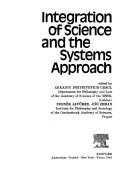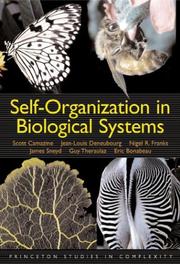| Listing 1 - 10 of 16 | << page >> |
Sort by
|

ISBN: 038712960X 354012960X 3642694233 3642694217 Year: 1983 Publisher: Berlin Springer
Abstract | Keywords | Export | Availability | Bookmark
 Loading...
Loading...Choose an application
- Reference Manager
- EndNote
- RefWorks (Direct export to RefWorks)
Brain --- Systems Theory. --- 591.481.1 --- 591.181 --- General Systems Theory --- Queuing Theory --- General Systems Theories --- Queuing Theories --- Systems Theories --- Systems Theories, General --- Systems Theory, General --- Theories, General Systems --- Theories, Queuing --- Theories, Systems --- Theory, General Systems --- Theory, Queuing --- Theory, Systems --- Systems Biology --- Congresses. --- physiology. --- Brain of vertebrates. Encephalon. Cerebellum --- Excitability and physiology of the nerves in general. Electrophysiology --- 591.181 Excitability and physiology of the nerves in general. Electrophysiology --- 591.481.1 Brain of vertebrates. Encephalon. Cerebellum --- Systems Theory --- Congresses --- physiology --- Thermodynamics

ISBN: 0444996338 Year: 1984 Publisher: Amsterdam Elsevier
Abstract | Keywords | Export | Availability | Bookmark
 Loading...
Loading...Choose an application
- Reference Manager
- EndNote
- RefWorks (Direct export to RefWorks)
Philosophy. --- Science. --- Systems Theory. --- Cognition --- Dialectical materialism --- Science --- -System theory --- Systems, Theory of --- Systems science --- Natural science --- Science of science --- Sciences --- Materialism, Dialectical --- Philosophy, Marxist --- Socialism --- Psychology --- General Systems Theory --- Queuing Theory --- General Systems Theories --- Queuing Theories --- Systems Theories --- Systems Theories, General --- Systems Theory, General --- Theories, General Systems --- Theories, Queuing --- Theories, Systems --- Theory, General Systems --- Theory, Queuing --- Theory, Systems --- Systems Biology --- Philosophical Overview --- Hedonism --- Stoicism --- Overview, Philosophical --- Overviews, Philosophical --- Philosophical Overviews --- Philosophies --- Philosophy --- Cognition. --- Dialectical materialism. --- System theory. --- Systems theory --- Systems theory. --- System theory --- Systems Theory --- Pharmacy Philosophy --- Pharmacy Philosophies --- Philosophies, Pharmacy --- Philosophy, Pharmacy --- Normal science --- Philosophy of science

ISBN: 0471279110 9780471279112 Year: 1990 Publisher: Chichester Wiley
Abstract | Keywords | Export | Availability | Bookmark
 Loading...
Loading...Choose an application
- Reference Manager
- EndNote
- RefWorks (Direct export to RefWorks)
Systems Theory. --- 681.3*H --- 65.01 --- System theory --- Systems, Theory of --- Systems science --- Science --- 65.01 Methods and methodology. Theory and practice of organization --- Methods and methodology. Theory and practice of organization --- 681.3*H Information systems --- Information systems --- General Systems Theory --- Queuing Theory --- General Systems Theories --- Queuing Theories --- Systems Theories --- Systems Theories, General --- Systems Theory, General --- Theories, General Systems --- Theories, Queuing --- Theories, Systems --- Theory, General Systems --- Theory, Queuing --- Theory, Systems --- Systems Biology --- Philosophy --- Systems Theory --- Mathematical control systems --- Planning (firm) --- System theory. --- Méthodologie --- Méthodologie --- Ingenieurie --- Résolution de problemes
Periodical
Abstract | Keywords | Export | Availability | Bookmark
 Loading...
Loading...Choose an application
- Reference Manager
- EndNote
- RefWorks (Direct export to RefWorks)
Sociobiology --- Human biology --- Anthropology --- Sociology --- Anthropology. --- Human biology. --- Sociobiology. --- Sociology. --- Évolution (Biologie) --- Sociobiologie. --- Anthropologie. --- Sociologie. --- Développement de la personnalité --- Systems Theory. --- General Systems Theory --- Queuing Theory --- General Systems Theories --- Queuing Theories --- Systems Theories --- Systems Theories, General --- Systems Theory, General --- Theories, General Systems --- Theories, Queuing --- Theories, Systems --- Theory, General Systems --- Theory, Queuing --- Theory, Systems --- Social theory --- Biologism --- Cultural Evolution --- Evolution --- Social Change --- Systems Theory --- Social sciences --- Human evolution --- Psychology, Comparative --- Social evolution --- Biology --- Physical anthropology --- Human beings --- Systems Biology --- Modernization --- Social Development --- Social Impact --- Change, Social --- Changes, Social --- Development, Social --- Developments, Social --- Impact, Social --- Impacts, Social --- Social Changes --- Social Developments --- Social Impacts --- Group Processes --- Evolution, Cultural --- Cultural Evolutions --- Evolutions, Cultural --- Social aspects --- Cultural Evolution. --- Evolution. --- Social Change. --- Social Evolution. --- Biological Evolution --- Biological Evolution. --- Evolution, Social --- Evolution, Biological --- Genetics, Behavioral --- Primitive societies --- Anthropology, Cultural --- Cultural Anthropology --- Material Culture --- Ethnography --- Culture, Material --- Ethnographies --- Material Cultures --- Qualitative Research --- Sociobiologie --- Biologie humaine --- Anthropologie --- Sociologie --- Social Evolution
Periodical
Abstract | Keywords | Export | Availability | Bookmark
 Loading...
Loading...Choose an application
- Reference Manager
- EndNote
- RefWorks (Direct export to RefWorks)
Family medicine --- Family psychotherapy --- Family medicine. --- Family psychotherapy. --- Family Practice. --- Systems Theory. --- General Systems Theory --- Queuing Theory --- General Systems Theories --- Queuing Theories --- Systems Theories --- Systems Theories, General --- Systems Theory, General --- Theories, General Systems --- Theories, Queuing --- Theories, Systems --- Theory, General Systems --- Theory, Queuing --- Theory, Systems --- Family Practices --- Practice, Family --- Practices, Family --- Family group therapy --- Family therapy --- Family practice (Medicine) --- General practice (Medicine) --- Systems Biology --- Families --- Group psychotherapy --- Marriage counseling --- Medicine --- Physicians (General practice) --- Health and hygiene --- Gezinstherapie. --- Family. --- Family Therapy. --- Therapy, Family --- Family Therapies --- Therapies, Family --- Extended Family --- Family Life Cycle --- Family Research --- Filiation --- Kinship Networks --- Relatives --- Family Life Cycles --- Family Members --- Family, Reconstituted --- Stepfamily --- Extended Families --- Families, Extended --- Families, Reconstituted --- Family Member --- Family, Extended --- Kinship Network --- Life Cycle, Family --- Life Cycles, Family --- Network, Kinship --- Networks, Kinship --- Reconstituted Families --- Reconstituted Family --- Research, Family --- Stepfamilies --- Grandparents

ISBN: 0444011552 Year: 1987 Publisher: New York, NY : Elsevier,
Abstract | Keywords | Export | Availability | Bookmark
 Loading...
Loading...Choose an application
- Reference Manager
- EndNote
- RefWorks (Direct export to RefWorks)
Brain --- Cognition --- Systems Theory. --- Artificial intelligence --- Neural networks (Computer science) --- Neurophysiology --- System theory --- Systems, Theory of --- Systems science --- Science --- Nervous system --- Neurobiology --- Physiology --- Artificial neural networks --- Nets, Neural (Computer science) --- Networks, Neural (Computer science) --- Neural nets (Computer science) --- Natural computation --- Soft computing --- AI (Artificial intelligence) --- Artificial thinking --- Electronic brains --- Intellectronics --- Intelligence, Artificial --- Intelligent machines --- Machine intelligence --- Thinking, Artificial --- Bionics --- Cognitive science --- Digital computer simulation --- Electronic data processing --- Logic machines --- Machine theory --- Self-organizing systems --- Simulation methods --- Fifth generation computers --- Neural computers --- General Systems Theory --- Queuing Theory --- General Systems Theories --- Queuing Theories --- Systems Theories --- Systems Theories, General --- Systems Theory, General --- Theories, General Systems --- Theories, Queuing --- Theories, Systems --- Theory, General Systems --- Theory, Queuing --- Theory, Systems --- Systems Biology --- physiology. --- Philosophy --- Systems Theory --- physiology --- Artificial intelligence. --- Neural circuitry

ISBN: 9780691116242 0691116245 0691012113 9780691012117 Year: 2001 Publisher: Princeton, N.J. Princeton University Press
Abstract | Keywords | Export | Availability | Bookmark
 Loading...
Loading...Choose an application
- Reference Manager
- EndNote
- RefWorks (Direct export to RefWorks)
The synchronized flashing of fireflies at night. The spiraling patterns of an aggregating slime mold. The anastomosing network of army-ant trails. The coordinated movements of a school of fish. Researchers are finding in such patterns--phenomena that have fascinated naturalists for centuries--a fertile new approach to understanding biological systems: the study of self-organization. This book, a primer on self-organization in biological systems for students and other enthusiasts, introduces readers to the basic concepts and tools for studying self-organization and then examines numerous examples of self-organization in the natural world. Self-organization refers to diverse pattern formation processes in the physical and biological world, from sand grains assembling into rippled dunes to cells combining to create highly structured tissues to individual insects working to create sophisticated societies. What these diverse systems hold in common is the proximate means by which they acquire order and structure. In self-organizing systems, pattern at the global level emerges solely from interactions among lower-level components. Remarkably, even very complex structures result from the iteration of surprisingly simple behaviors performed by individuals relying on only local information. This striking conclusion suggests important lines of inquiry: To what degree is environmental rather than individual complexity responsible for group complexity? To what extent have widely differing organisms adopted similar, convergent strategies of pattern formation? How, specifically, has natural selection determined the rules governing interactions within biological systems? Broad in scope, thorough yet accessible, this book is a self-contained introduction to self-organization and complexity in biology--a field of study at the forefront of life sciences research.
Biological systems --- Self-organizing systems --- Systèmes auto-organisés --- Biological systems. --- Self-organizing systems. --- Systèmes biologiques --- Biological Science Disciplines --- Systems Theory --- 591.5 --- 591.5 Animal habits. Animal behaviour. Ecology. Ethology. Animal and environment. Bionomy --- Animal habits. Animal behaviour. Ecology. Ethology. Animal and environment. Bionomy --- General Systems Theory --- Queuing Theory --- General Systems Theories --- Queuing Theories --- Systems Theories --- Systems Theories, General --- Systems Theory, General --- Theories, General Systems --- Theories, Queuing --- Theories, Systems --- Theory, General Systems --- Theory, Queuing --- Theory, Systems --- Systems Biology --- Biologic Sciences --- Biological Science --- Science, Biological --- Sciences, Biological --- Biological Sciences --- Life Sciences --- Biologic Science --- Biological Science Discipline --- Discipline, Biological Science --- Disciplines, Biological Science --- Life Science --- Science Discipline, Biological --- Science Disciplines, Biological --- Science, Biologic --- Science, Life --- Sciences, Biologic --- Sciences, Life --- Learning systems (Automatic control) --- Self-optimizing systems --- Cybernetics --- Intellect --- Learning ability --- Synergetics --- Biosystems --- Systems, Biological --- Biology --- System theory --- Systems biology --- Philosophy --- BIOLOGICAL SYSTEMS --- SELF-ORGANIZING SYSTEMS

ISBN: 0444410465 Year: 1972 Publisher: Amsterdam Elsevier
Abstract | Keywords | Export | Availability | Bookmark
 Loading...
Loading...Choose an application
- Reference Manager
- EndNote
- RefWorks (Direct export to RefWorks)
Compartmental analysis (Biology) --- Biology --- Mathematics --- Models, Biological --- Systems Theory --- 51-7 --- 681.3*J3 --- 681.3*J3 Life and medical sciences (Computer applications) --- Life and medical sciences (Computer applications) --- Biomathematics --- Tracers (Biology) --- 51-7 Mathematical studies and methods in other sciences. Scientific mathematics. Actuarial mathematics. Biometrics. Econometrics etc. --- Mathematical studies and methods in other sciences. Scientific mathematics. Actuarial mathematics. Biometrics. Econometrics etc. --- Mathematic --- General Systems Theory --- Queuing Theory --- General Systems Theories --- Queuing Theories --- Systems Theories --- Systems Theories, General --- Systems Theory, General --- Theories, General Systems --- Theories, Queuing --- Theories, Systems --- Theory, General Systems --- Theory, Queuing --- Theory, Systems --- Systems Biology --- Biological Model --- Biological Models --- Model, Biological --- Models, Biologic --- Biologic Model --- Biologic Models --- Model, Biologic --- Biomathematics. Biometry. Biostatistics
Book
Year: 2020 Publisher: Basel, Switzerland MDPI - Multidisciplinary Digital Publishing Institute
Abstract | Keywords | Export | Availability | Bookmark
 Loading...
Loading...Choose an application
- Reference Manager
- EndNote
- RefWorks (Direct export to RefWorks)
This Systems Thinking Special Issue contains 12 papers on the nature of systems thinking as it applies to systems engineering, systems science, system dynamics, and related fields. Systems thinking can be broadly considered the activity of thinking applied in a systems context, forming a basis for fundamental approaches to several systems disciplines, including systems engineering, systems science, and system dynamics. Although these are somewhat distinct fields, they are bound by common approaches in regard to systems. Whereas systems engineering seeks to apply a multidisciplinary, holistic approach to the development of systems, systems science seeks to understand the basics related to systems of all kinds, from natural to man-made, and system dynamics seeks to understand system structures in order to influence its dynamics. Man-made systems have become more ubiquitous and complex. The study of systems, both natural and engineered, presents new challenges and opportunities to understand emergent, dynamic behaviors that inform the process of sense-making based on systems thinking.
History of engineering & technology --- systems philosophy --- heuristic systems principles --- scientific systems principles --- general systems principles --- specialized systems principles --- general systems theory --- GST --- sustainability --- systems thinking --- UN sustainable development goals --- mental models --- neoliberalism --- ecological economics --- isomorphic systems processes (ISPs) --- Monterey Phoenix (MP) --- behavior modeling --- emergent behavior --- cycles and cycling --- systems processes theory (SPT) --- family --- family system --- natural systems thinking --- Murray Bowen --- integrative theory --- competence --- maturity models --- worldview --- Worldview Inquiry Framework --- General Inquiry Framework --- system thinking --- systems approach --- capacity for systems thinking --- Myers Briggs Type Indicator (MBTI) personality type test --- concept map --- termbase --- systems perspective --- ontology of systems --- frontier research --- shadow IT --- IT integration --- IT integration drawbacks --- application integration --- path dependency --- path biography --- switching costs --- education for sustainable development --- teacher education --- systems education --- soft systems methodology (SSM) --- bibliometrics --- academic impact of SSM --- data visualization --- systems engineering --- healthcare system design --- clinical models --- socio-technical system --- model-based systems engineering
Book
Year: 2020 Publisher: Basel, Switzerland MDPI - Multidisciplinary Digital Publishing Institute
Abstract | Keywords | Export | Availability | Bookmark
 Loading...
Loading...Choose an application
- Reference Manager
- EndNote
- RefWorks (Direct export to RefWorks)
This Systems Thinking Special Issue contains 12 papers on the nature of systems thinking as it applies to systems engineering, systems science, system dynamics, and related fields. Systems thinking can be broadly considered the activity of thinking applied in a systems context, forming a basis for fundamental approaches to several systems disciplines, including systems engineering, systems science, and system dynamics. Although these are somewhat distinct fields, they are bound by common approaches in regard to systems. Whereas systems engineering seeks to apply a multidisciplinary, holistic approach to the development of systems, systems science seeks to understand the basics related to systems of all kinds, from natural to man-made, and system dynamics seeks to understand system structures in order to influence its dynamics. Man-made systems have become more ubiquitous and complex. The study of systems, both natural and engineered, presents new challenges and opportunities to understand emergent, dynamic behaviors that inform the process of sense-making based on systems thinking.
systems philosophy --- heuristic systems principles --- scientific systems principles --- general systems principles --- specialized systems principles --- general systems theory --- GST --- sustainability --- systems thinking --- UN sustainable development goals --- mental models --- neoliberalism --- ecological economics --- isomorphic systems processes (ISPs) --- Monterey Phoenix (MP) --- behavior modeling --- emergent behavior --- cycles and cycling --- systems processes theory (SPT) --- family --- family system --- natural systems thinking --- Murray Bowen --- integrative theory --- competence --- maturity models --- worldview --- Worldview Inquiry Framework --- General Inquiry Framework --- system thinking --- systems approach --- capacity for systems thinking --- Myers Briggs Type Indicator (MBTI) personality type test --- concept map --- termbase --- systems perspective --- ontology of systems --- frontier research --- shadow IT --- IT integration --- IT integration drawbacks --- application integration --- path dependency --- path biography --- switching costs --- education for sustainable development --- teacher education --- systems education --- soft systems methodology (SSM) --- bibliometrics --- academic impact of SSM --- data visualization --- systems engineering --- healthcare system design --- clinical models --- socio-technical system --- model-based systems engineering
| Listing 1 - 10 of 16 | << page >> |
Sort by
|

 Search
Search Feedback
Feedback About UniCat
About UniCat  Help
Help News
News